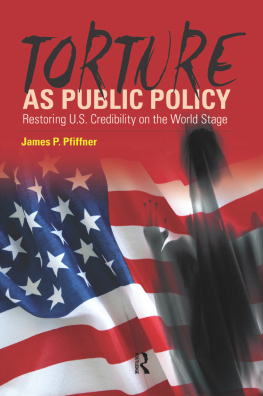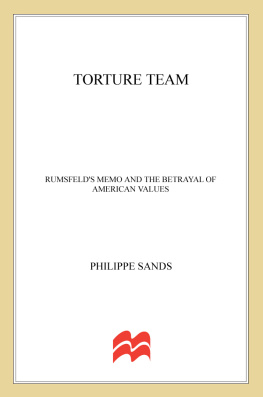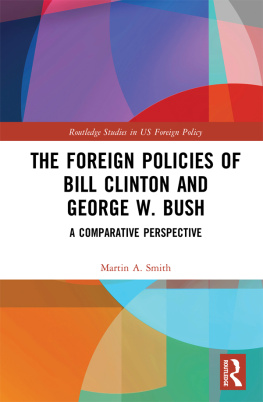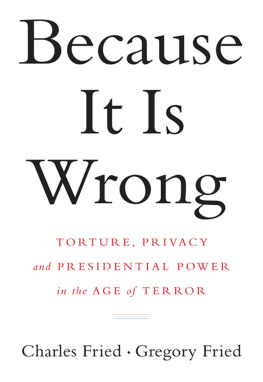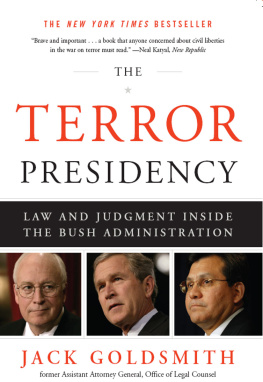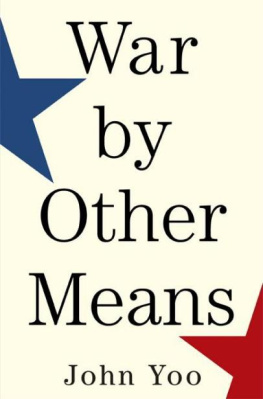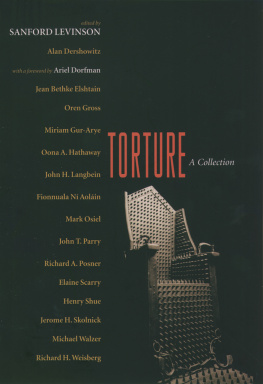First published 2010 by Paradigm Publishers
Published 2016 by Routledge
2 Park Square, Milton Park, Abingdon, Oxon OX14 4RN
711 Third Avenue, New York, NY 10017, USA
Routledge is an imprint of the Taylor & Francis Group, an informa business
Copyright 2010, Taylor & Francis.
All rights reserved. No part of this book may be reprinted or reproduced or utilised in any form or by any electronic, mechanical, or other means, now known or hereafter invented, including photocopying and recording, or in any information storage or retrieval system, without permission in writing from the publishers.
Notice:
Product or corporate names may be trademarks or registered trademarks, and are used only for identification and explanation without intent to infringe.
Library of Congress Cataloging-in-Publication Data
Pfiffner, James P.
Torture as public policy : restoring U.S. credibility on the world stage / James P. Pfiffner.
p. cm.
Includes bibliographic references and index.
ISBN 978-1-59451-508-8 (hardcover : alk. paper)
ISBN 978-1-59451-509-5 (paperback : alk. paper)
1. TortureUnited States. 2. TortureGovernment policyUnited States. 3. Political prisonersAbuse ofUnited States. 4. United StatesForeign public opinion. I. Title.
HV8599.U6P54 2009
364.67dc22
20090150680
Designed and typeset by Straight Creek Bookmakers
ISBN 13 : 978-1-59451-508-8 (hbk)
ISBN 13 : 978-1-59451-509-5 (pbk)
When I saw the photographs from Abu Ghraib in the spring of 2004, my first reaction was, This is the United States of America, we are not supposed to do this. My second reaction was that the perpetrators of the torture and humiliation were a bunch of immature kids who were not trained for their job and were acting out their own sadistic fantasies. But the further I looked into this sad episode in our history, the more I realized that the sadism depicted in the photographs was not an isolated incident perpetrated by a few bad apples. The apples were bad all right, but the context within which they performed their sadism was systemic, and it reached all the way up the chain of command. An important part of the barrel was rotten.
This book is the way I dealt (and am dealing) with the sad and unfortunate events during the war on terror that resulted in the systematic torture of detainees. My way of coping with these horrors was to try to understand the events analytically. Why did this happen? How did this happen? Who was responsible? Is torture ever justified? Although it is understandable that, in the immediate aftermath of 9/11, the Bush administration felt that a harsh interrogation policy was necessary, it continued to hew to its policy position for the rest of the administration, even after the photos of Abu Ghraib were made public and it was clear that Iraq had nothing to do with 9/11.
Part of my reaction to the revelations of U.S. torture came from my experience as a soldier in the jungles of Vietnam and Cambodia in 1970. At that time I could imagine the possibility of being captured, and I did not want our enemies to have any excuse to torture me. Of course, a U.S. prohibition of torture does not mean that our enemies will also forswear its use, as John McCains experience in Vietnam demonstrates. But as he pointed out with respect to Bush administration policy, that is not the point. In his words: This is not about them. This is about us.
In the past, the United States has been a champion of human rights and an international leader in condemning torture. Adopting the brutality of our enemies undermines the cause of justice throughout the world and severely hampers our ability to use moral suasion to influence the behavior of brutal regimes. It also dulls our revulsion toward torture and enables sadists to think they are acting as patriots. Colin Powell argued that torture would undermine U.S. ideals in a private memorandum to President Bush and in a public letter to members of Congress. The professional Judge Advocate General lawyers in the Pentagon objected to the Bush administrations policy, but they were often not informed of the interrogation policies until they had already been formulated and were faits accompli.
Civilian control of the military is an important principle upon which this nation is based; this is the way it should remain. But the Bush administration failed to heed the warnings of both civilian and military career professionals, and this led to the abandonment of our ideals. U.S. torture policy and its implementation have caused immeasurable harm to our reputation throughout the world; we have been excoriated by our allies and condemned by our enemies. Innumerable terrorists and fighters against the United States have been recruited in reaction to our interrogation policies.
Although torture has probably accompanied most wars in human history, including those of the United States, it is one thing for individuals to violate laws, rules, and policies and engage in torture. It is quite another thing for the President of the United States to override warnings and to suspend the Geneva Conventions. This decision set in motion a chain of policy directives that led to the abuse and torture of detainees. The president approved of meetings of National Security Council principals that made decisions about enhanced interrogation techniques to be used on detainees. As John Ashcroft said at one of the meetings, history will not judge this kindly.
Four years after the atrocities of 9/11, the president publicly urged Congress to pass a law (the Military Commissions Act) that would allow his administration to continue with the program, which involved interrogation techniques that most people in the world consider to be torture. The presidents administration also developed a range of policy directives that were recorded in official memoranda and were circulated through the chain of command, setting the conditions under which torture took place. These were all authoritative policy decisions: thus the title of this book and the impetus for writing it.
Acknowledgments
In writing this book, I have profited greatly from the help and advice of many friends and colleagues. The leadership of the School of Public Policy at George Mason University has established a commitment to scholarship from which I have benefitted. Thanks are due to Dean Kingsley Haynes and Vice Dean Jim Finkelstein, who have built SPP into an impressive home for public policy scholars and teachers. Much of the research for this book was completed when I was at the Institute for Advanced Study at the University of London, and I want to express my gratitude to Deans Nicholas Mann and James Dunkerley for their hospitality when I was their guest at University College as S.T. Lee Professorial Fellow for six months. Many colleagues in the UK gave me helpful advice and invited me to give talks on U.S. interrogation policy and the Iraq War, and I want to thank Sharer Ali, Neils Bjerre-Poulson, Nigel Bowles, Steve Casey, Philip Davies, John Dumbrell, Jose Harris, Jon Herbert, Timothy Lynch, Iwan Morgan, John Owens, Mark Phythian, Jon Roper, Richard Rose, and Colin Talbot.

